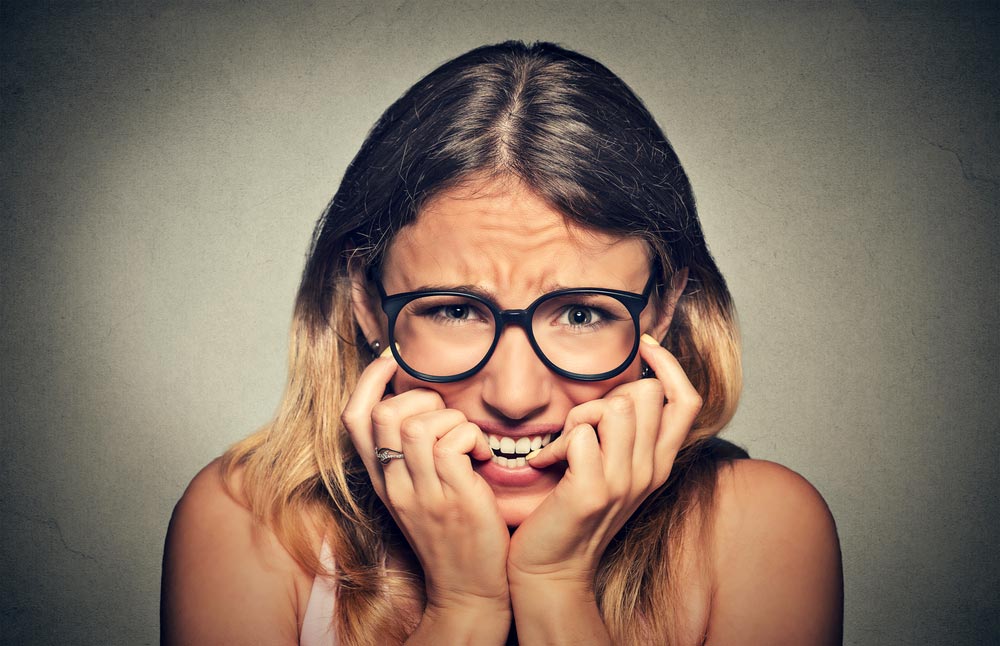
pathdoc / Shutterstock.com
In a particularly memorable scene in Dirty Dancing, Johnny, the hotshot dance instructor at a resort, asks Billy, another resort staffer, why Baby, a resort attendee, is at a staff-only dance party. Billy tries to take credit and play it off as a date, saying, “She came with me.” Baby comes out with the charming line, “I carried a watermelon.” Immediately you see the regret flash on her face, and she mocks herself, saying, “I carried a watermelon,” in such a tone that you can tell she’s mortified. You would be too if you just told the person you have a massive crush on that you carried a watermelon.
That cringing embarrassment, though horrible, is common. Think about it. Have you ever had one of those moments where you just want to suck your words back into your mouth? Or where you marvel at how weird you acted during a particular situation? Do you ever think back to an event that happened years ago and wonder how you manage to have any friends at all? Me, I had an “eat my words” moment just last night. And while I wanted to melt into my chair and never resurface, everyone I was with seemed to brush it off—not that it mattered to me.
Embarrassment is a really complex emotion. How embarrassed you feel, or whether you feel embarrassed about something at all, has to do with your actions, the context of your actions, how you imagine that other people perceive your actions, and how you perceive your own actions.
For example, you could get embarrassed when you trip on your shoelace in public and there are witnesses. This could be because you’re embarrassed that you physically tripped, because you imagine that everyone who saw you trip thinks you’re an idiot, or because you think that tripping means you can’t walk, which shows a lack of grace. You could get embarrassed about tripping on your shoelace in public even if there weren’t any witnesses, because you imagine how awful it would’ve been if someone saw you. You might not get embarrassed about tripping if the only witness was your best friend, but if your boss, coworker, or crush saw you, you might blush and get flustered. Aren’t brains fun?
According to Dr. Mary Lamia, writing for Psychology Today, “The experience of embarrassment alerts you to your failure to behave according to certain social standards, which threaten the beliefs you hold concerning how others evaluate you as well as the ways in which you evaluate yourself.”
So, with the tripping example, your embarrassment may stem from the fact that tripping on your shoelace isn’t a common occurrence and that the people who witness you trip may think less of you than if you’d walked without failing.
So what does that feeling of embarrassment mean?
- That you’re sorry
- That you understand you did something outside of social norms
- That you actually do know how to behave in front of other people, but were sidetracked by a fluke occurrence and your body is subconsciously punishing you for it
- That you are acting appropriately to reduce the tension in an otherwise uncomfortable situation (by laughing, blushing, looking away, etc.)
- That you’re trying to level the playing field—people tend to react to embarrassment with more embarrassment because it’s uncomfortable for everyone
When you show embarrassment, it’s almost an act of submission. You know that whatever you did wasn’t socially acceptable for the context you’re in, and you want to make it right with the people who saw you. You’re nonverbally asking for forgiveness, and by displaying socially expected behavior (i.e., embarrassment), you’re likely to get it.
Given all that, though, why do people still cringe when they think about past embarrassment?
It comes down to something called the “spotlight effect.” According to Dr. Nathan Heflick, also writing for Psychology Today, “The ‘spotlight effect’ refers to the tendency to think that more people notice something about you than they do. [...] Basically, it is the result of egocentrism. We all are the center of our own universes. This is not to say we are arrogant, or value ourselves more than others, but rather, that our entire existence is from our own experiences and perspective. And we use those experiences to evaluate the world around us, including other people.”
Fortunately for you, this applies to everyone. With the rest of the world so wrapped up in their own minds and their own actions (and their own embarrassment), there isn’t too much time for anyone else to focus on your faults. So whether you rip your pants in public, say something awkward at a party, or snort one time while laughing, people definitely aren’t paying as much attention to it as you are. There’s no need to play these situations over and over again in your head. (I know… easier said than done. I still remember in vivid detail the first time I asked a boy on a date. I’d obviously didn’t go well.)
Long story short? Everyone has something, so give yourself a break and laugh it off.
How do you deal with embarrassing situations?
-
Why Résumé Padding Doesn’t Always Work
-
Unique (and Really Cool) Extracurriculars at Colleges around the Country
-
My College Story: Student, Employee and Business Owner
-
My College Story: The Power of Motivational Majors and Self-Education
-
ACT Prep Tips for Overwhelmed Students
-
What You Can Do to Get Ahead Over Summer Break
-
Tu lengua materna y cómo empezar a estudiar inglés
-
What to Do When You Think Your Teacher Hates You
-
Executive Functioning Skills: Focus and Self-Control
-
Do Employers Look at More than Your Résumé and Transcripts?

